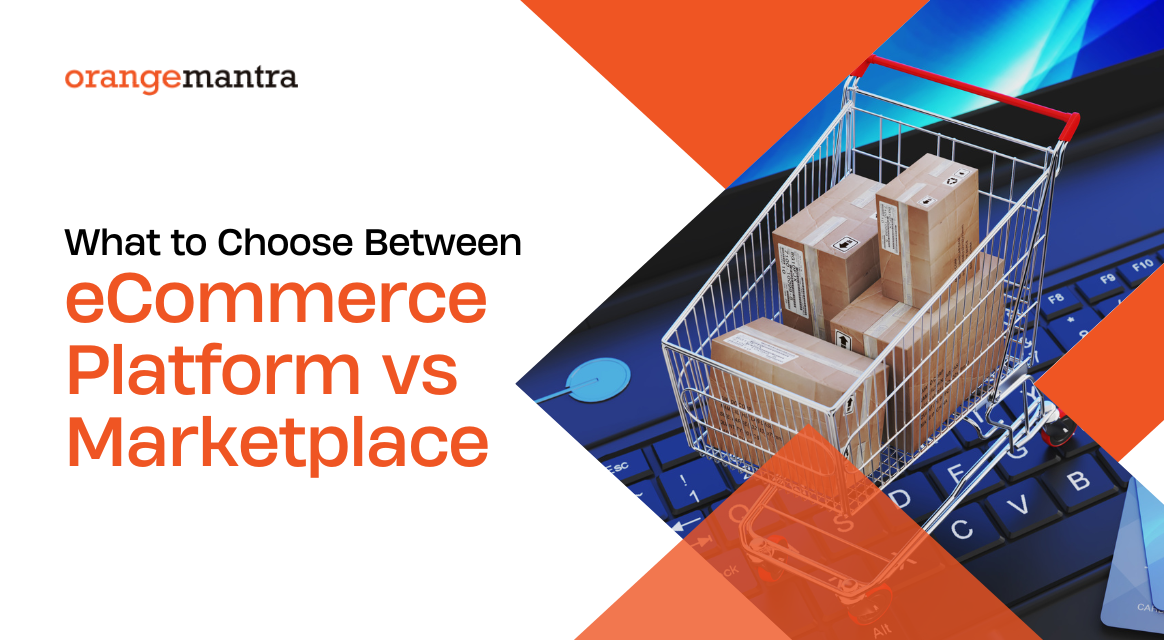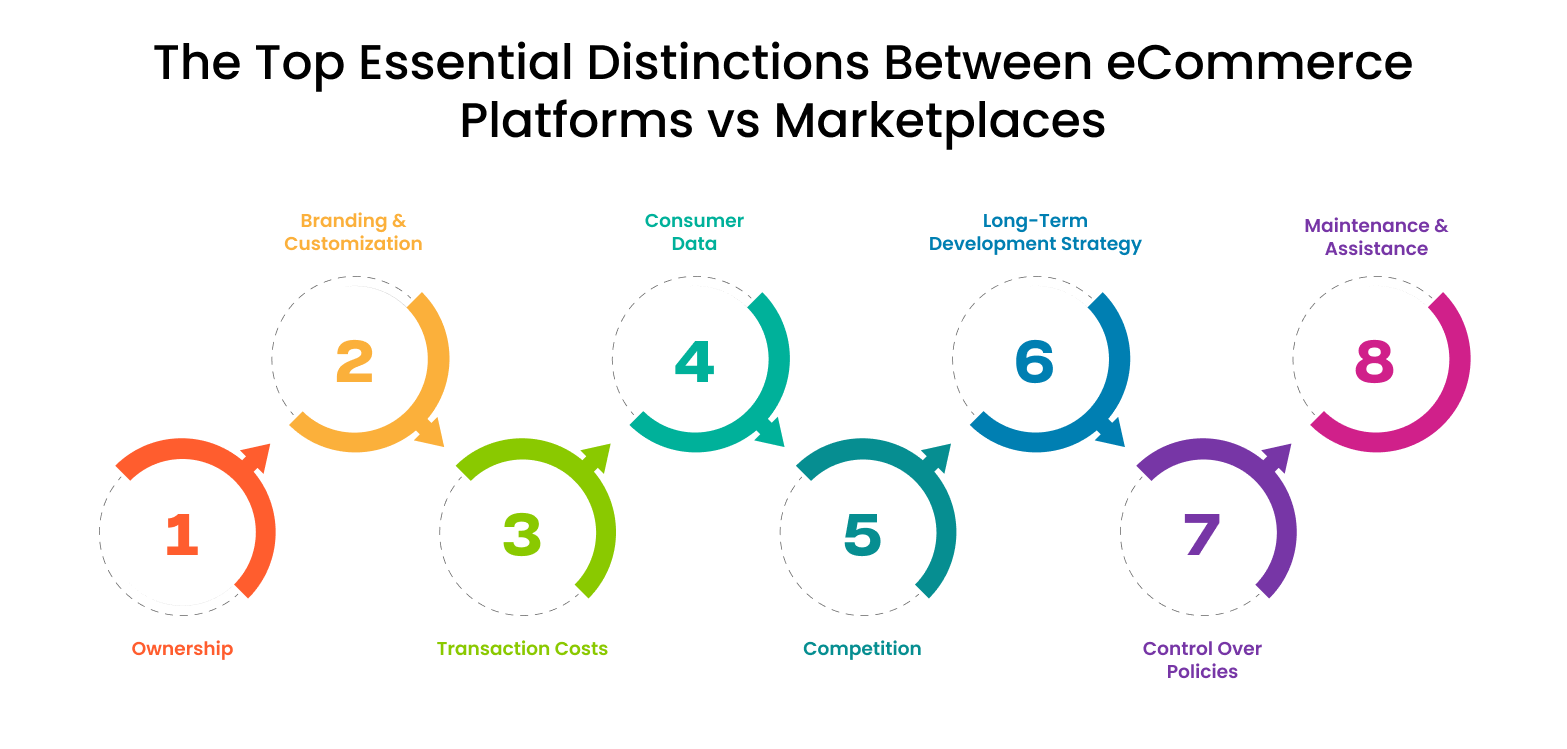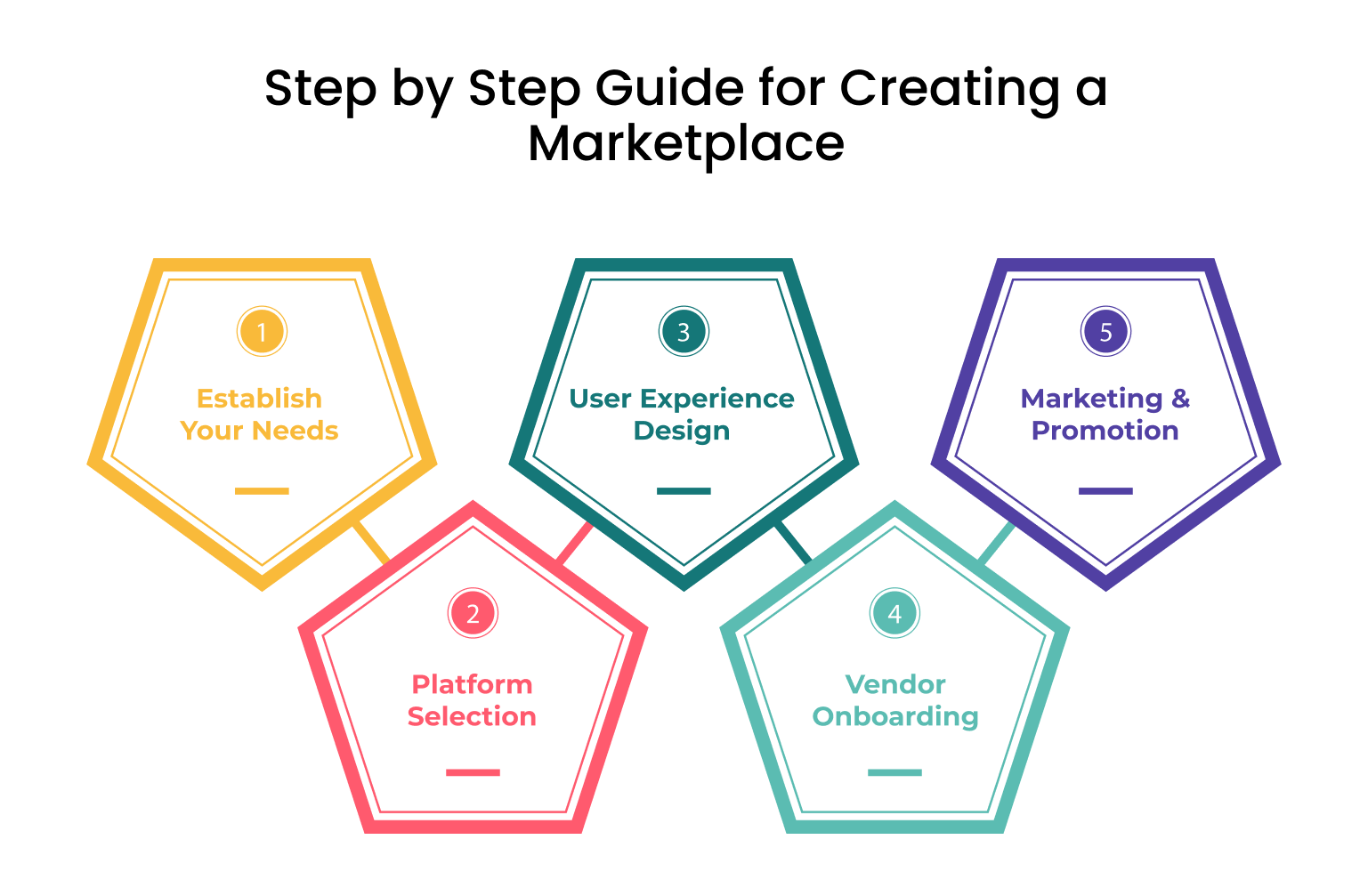
Here’s what you will learn:
Businesses and entrepreneurs must comprehend the fundamental distinctions between an eCommerce platform vs marketplace in the ever-changing realm of online commerce. Although there are chances to sell goods online with these methods, they function differently. This blog will discuss the development, functional aspects, and variations between these two models. We will also provide advice on how to create your marketplace and walk you through the process of switching from a marketplace to an eCommerce platform.
Table of Contents
eCommerce Platform Vs Marketplace Evolution
In recent years, the eCommerce sector has grown remarkably. Global retail eCommerce sales are expected to reach an astounding $6.38 trillion by 2025. eCommerce custom software development quick expansion, it’s critical to comprehend the subtle differences between various internet selling approaches.
The Top 5 Amazing Statistics Facts for Marketplace Vs eCommerce Platform in 2025
- From 2019 to 2025, the size of the eCommerce market is expected to expand at a CAGR of 14.7%.
- It is predicted that by 2025, sales of mobile eCommerce will equal $4.21 trillion, or over 75% of all eCommerce sales.
- In terms of market share, Asia-Pacific is anticipated to overtake North America and Europe to lead the eCommerce industry.
- Online buying behavior has been greatly affected by the growth of social media and influencers; 54% of consumers now make purchases directly via social media platforms.
- Given that 80% of customers are more likely to make a purchase when provided with a personalized experience, personalization and customer segmentation are the industry’s driving factors in eCommerce.
What is Marketplace and its Affective Features?
An online platform that links buyers and sellers and offers a centralized location for transactions is called a marketplace. A marketplace allows many merchants to display and sell their goods, with the platform handling transaction processing and collecting a commission.
The Top 5 Features Affecting Business in 2025
Broad Reach
Due to the vast client base of marketplaces, it is simpler for merchants to locate possible purchasers.
Increased Visibility
Sellers get more exposure and visibility to a wider audience by putting their items on a marketplace.
Simplified Payment Process
By handling payments, marketplaces provide both buyers and sellers with a safe and easy experience.
Evaluations and Ratings>
eCommerce app development helps customers to give evaluations and ratings, which aid in establishing the authenticity and trustworthiness of merchants.
Marketing Assistance
To assist sellers, and increase their sales, a lot of marketplaces provide marketing resources and advertising chances.
What is eCommerce Platform and Its Affecting Features?
A software program called an eCommerce platform enables companies to design and run an online shop. eCommerce consultancy helps a lot in the development phase of an eCommerce system. An eCommerce platform, as opposed to a marketplace, gives you total control over branding, customization, and consumer experience.
The Top 5 Features Affecting Business in 2025
Brand Control
Companies can design a distinctive and customized online shop since they have complete control over their brand identification.
Customization Choices
eCommerce website development helps businesses to customize the look, feel, and user experience of their shop with the help of the many customization choices provided by eCommerce platforms.
Control of Customer Data
In contrast to a marketplace, companies maintain control of customer data, which enables them to create enduring connections and use tailored marketing tactics.
Flexibility and Scalability
eCommerce platforms provide the framework required for a company to expand and scale, enabling the smooth integration of more services and outside apps.
Analytics and Insights
eCommerce systems provide comprehensive reporting and analytics solutions that give companies insightful information about consumer behavior, sales figures, and marketing tactics.
The Top 8 Essential Distinctions Between eCommerce Platform vs Marketplace
Ownership
Sellers in marketplaces are not the platform’s owners. eCommerce systems, on the other hand, provide companies with total control and ownership over their online shop.
Branding and Customization
While Custom eCommerce development platforms provide a wide range of customization options to help create a distinctive brand identity, marketplaces limit these choices.
Transaction Costs
While eCommerce platforms often charge set monthly membership costs or transaction fees based on the selected plan, marketplaces charge a commission on each sale completed. custom eCommerce development helps a lot in the base design of the system.
Consumer Data
While eCommerce platforms allow companies to gather and use consumer data for targeted marketing campaigns, marketplaces retain control of customer data.
Competition
While choosing between eCommerce platform vs marketplace, eCommerce platforms provide companies the ability to stand out and set themselves apart from rivals, in a marketplace, merchants engage in direct competition with one another on the same platform.
Long-Term Development Strategy
By using consumer data, launching focused marketing efforts, and developing a strong brand presence, an eCommerce platform enables companies to carry out long-term development strategies.
Control Over Policies
While companies utilizing an eCommerce platform vs marketplace, eCommerce platform can create their policies based on their requirements and preferences, marketplaces have predetermined rules and restrictions that merchants must follow.
Maintenance and Assistance
While companies using eCommerce, platforms are in charge of upkeep and updates to their own online stores, marketplace platforms take care of technical maintenance and aid sellers.
-
If I already have a loyal client base, can I go from a marketplace to an eCommerce platform?
Moving from a marketplace to an eCommerce platform is feasible without losing your clientele. During the shift, careful preparation, data transfer, and communication with your current customers are essential.
-
Can my eCommerce platform be integrated with the listings on an existing marketplace?
You can connect your product listings, depending on the eCommerce platform vs marketplace. Examine the integration options that are accessible and make sure that the transmission of all product information is correct.
-
Do I need to know how to code to create my marketplace?
The majority of eCommerce marketplace development provides user-friendly interfaces and customization choices that don’t need advanced coding expertise, however, some familiarity with basic coding can be beneficial. However, for complex customization or special features, expert help could be needed.
5 Easy Steps to Convert Marketplace Listings to eCommerce Platform
Marketplaces is a collection of multiple stores on a single platform and the eCommerce platform doesn’t support this feature to the users.
Select an eCommerce Platform
Do your homework and find an eCommerce platform that fits your needs and company objectives.
Product Catalogue Migration
Make sure each product has corrected and comprehensive information by moving your product listings from the marketplace to the eCommerce platform.
Design & Customize Your Online Shop
Make advantage of the eCommerce platform’s customization features to establish an aesthetically pleasing and intuitive online shop.
Configure Shipping and Payment Options
Set up delivery options and payment channels to suit your company’s requirements and provide clients ease.
Test and Launch
Before making your freshly converted web shop public, test its usability and operation.
How to Create a Marketplace in Just 5 Easy Steps
Establish Your Niche
Choose a certain eCommerce platform vs marketplace market or product line that your marketplace will serve. Establish the specialized or particular market group that your marketplace will serve first. A well-defined niche creates the groundwork for a successful marketplace, whether it’s via distinctive goods, specialty services, or a specific market segment.
Platform Selection
Select a dependable marketplace platform with appropriate integration options, security, and scalability. Pick a dependable, feature-rich marketplace platform that complements your company objectives. Seek for systems with strong security features, easy integration possibilities, and expandability to handle future expansion. Well-liked options include WooCommerce on WordPress, Shopify, Magento 2 development, and bespoke solutions.
User Experience Design
Provide a simple, easy-to-use interface that promotes interaction and smooth navigation. Provide an intuitive user interface that improves both consumers’ and sellers’ experiences in general. Give simplicity and navigability top priority. A pleasant user experience promotes user involvement and repeats visits. It is facilitated by intuitive design components, clear product/service categorization, and a quick checkout procedure.
Vendor Onboarding
Create a smooth onboarding procedure for suppliers, making sure they adhere to the rules and specifications of your marketplace. Provide a seamless vendor onboarding experience when they join your marketplace. Magento Development clearly explains expectations, guidelines, and requirements. Establish an easy-to-use registration process and aid sellers in opening their stores. Simplifying the onboarding process guarantees a varied and superior vendor pool.
Marketing and Promotion
Use social media, influencer partnerships, and targeted advertising as powerful marketing tools to draw merchants and customers to your marketplace. Put in place a strong marketing plan to draw sellers and buyers to your marketplace. Make use of influencer relationships, social media channels, and focused marketing campaigns. With the help of strategic eCommerce website development, do emphasize your marketplace’s unique selling points to draw in suppliers and raise awareness among prospective customers.
You can create a successful marketplace that caters to the demands of your target market and offers both merchants and buyers a smooth and pleasurable experience by following these five essential steps.
Final Thoughts
Firms navigating the world of online selling must comprehend the differences between an eCommerce platform vs marketplace. Both solutions support various business types and provide special benefits. Businesses can achieve success in the fiercely competitive eCommerce sector by making well-informed choices that are in line with their objectives and taking advantage of the important features, distinctions, and migration procedures.
FAQ’s
Q1. What distinguishes an eCommerce platform from a marketplace primarily?
A single online shop where a company sells its goods to customers directly is called an eCommerce platform. A marketplace, on the other hand, is a venue that links different vendors and possible customers, generating a varied ecology of goods and services.
Q2. Are marketplaces and eCommerce platforms separate things, or can one serve the other?
Indeed, Shopify Plus development systems include features for both marketplaces and eCommerce, running at an extensive scale. All things considered, the fundamental difference still stands: an eCommerce platform mainly offers goods from a single company, while a marketplace mediates transactions between several vendors and customers.
Q3. What are the benefits of using an eCommerce platform for my company?
An eCommerce platform gives a company a specific area to market and sell its goods. It gives you command over price, branding, and customer service. For companies that specialize in a certain line of goods or services, it’s perfect.
Q4. What are the benefits that sellers and buyers have in a marketplace?
A marketplace gives vendors easier access to a larger client base and more efficient logistics. Customers gain from a large selection of goods, affordable prices, and the ease of locating many vendors in one location.
Q5. Can companies transition from operating as an eCommerce platform to taking part in a marketplace model?
Indeed, companies can choose between models according to their development plans. Some companies begin as standalone eCommerce platforms and then grow into marketplaces to add more products to their portfolio.
Q6. What aspects of an eCommerce platform or marketplace model should firms consider?
Think about your target market, your company objectives, and the kind of goods or services you provide. An eCommerce platform can be appropriate if you want complete control over your brand and have a particular product range. A marketplace can be a better option if your goal is to link many merchants and provide a wider selection of goods.




